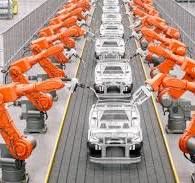Europe Automotive Robotics Market Analysis
The Europe Automotive Robotics Market is poised for robust growth, projected to expand from US$ 2.67 billion in 2023 to US$ 6.63 billion by 2032, at a compound annual growth rate (CAGR) of 10.66% from 2024 to 2032.
Europe Automotive Robotics Market Overview
As Europe embraces climate initiatives and digital transformation, automotive robotics play an increasingly crucial role in meeting operational efficiency demands, improving work environments, and ensuring employee safety. The European automotive industry is experiencing a technological shift, focusing on innovations in automation, sustainability, and cost-efficiency, with significant investments in fully automated production facilities. This trend is expected to support substantial revenue growth across the European market.
Key Market Drivers
- Rising Consumer Demand for Vehicles: The demand for cars and vehicle parts across Europe, including categories such as two-wheelers, trucks, and off-road vehicles, is pushing automotive manufacturers to increase production. This demand is accompanied by a shift toward automated processes to boost flexibility and efficiency in assembly lines.
- Technological Advancements: Robotics are essential in enhancing the production of electric and autonomous vehicles. Companies are increasingly adopting robotic systems tailored to specific applications in manufacturing, such as robotic welding and automation for vehicle parts, meeting high precision and safety standards while optimizing labor.
- Automated and Robotic Welding: Robotic welding has become a cornerstone in European automotive manufacturing, particularly for electric vehicles and autonomous vehicles. For instance, Ficep UK introduced the Sabre robotic welder in partnership with AGT Robotics to handle structural steel erection, addressing labor shortages while enhancing efficiency.
Related Report :
China Automobile Market
Europe Automotive Vehicle Market
Automotive Actuators Market
Germany’s Automotive Robotics Market
Germany is at the forefront of automotive robotics, driven by leading automakers like BMW and Ford Motor Co., who integrate robotics into EV production and other advanced vehicle manufacturing processes. Robotics in Germany’s automotive sector, particularly in welding and automation, have increased output quality and reduced costs and errors. Recently, Volkswagen Commercial Vehicles adopted Realtime Robotics’ Optimization-as-a-Service for an EV manufacturing pilot project, emphasizing Germany’s commitment to advanced robotics solutions in the automotive industry.
Major Companies and Developments
Europe’s automotive robotics market comprises leading companies such as ABB, FANUC Corporation, Yaskawa Electric Corporation, Rockwell Automation Inc., KUKA AG, and Kawasaki Heavy Industries. These companies continuously innovate, releasing new robotic models to meet the high demand for automotive robotics:
- FANUC Corporation introduced the CRX family of collaborative robots, which support various payloads, enhancing flexibility in manufacturing.
- BMW i Ventures invested in Plus One Robotics to advance logistical robot vision software, supporting supply chain and logistics automation.
Market Segmentation
- By Component: Sensors, Controllers, End Effectors, Robotic Arms, Drives, Others.
- By Robot Type: Articulated, Cartesian, Scara, Cylindrical, Others.
- By Application: Welding, Material Handling, Painting, Cutting, Others.
- By Country: Germany, UK, France, Russia, Spain, Italy, and Rest of Europe.
Company Analysis
The competitive landscape of the European automotive robotics market includes prominent players like ABB, FANUC Corporation, Yaskawa Electric Corporation, Omron Adept Robotics, Kawasaki Robotics, Harmonic Drive Systems, Nachi-Fujikoshi Corp., and KUKA Robotics. Key areas of analysis for each player include recent developments, product portfolio, and revenue trends.
About the Company:
Renub Research is a Market Research and Information Analysis company with more than 15 years of experience in Research, Survey, and Consulting. Our research helps companies to take business decisions: on strategy, organization, operations, technology, mergers & acquisitions, etc. Till now we have published more than 9000 syndicated reports and worked on more than 750 custom research projects. Currently, we are supplying data to EMIS, Bloomberg, Thomson Reuters, etc. We support many blue-chip companies by providing them with findings and perspectives across a wide range of markets.

